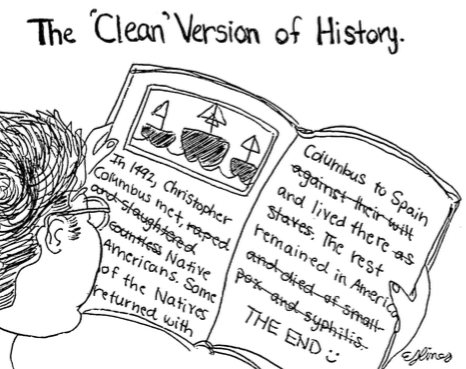
Around this time of year, students across the country learn about Christopher Columbus’ voyage that led to his eventual exploration of America. They’re taught catchy poems (“In 1492, Columbus sailed the ocean blue!”), they complete Columbus-themed crafts and activities and in most cases, enjoy a day off in celebration of the man who allegedly discovered our country.
However, as most of us enter adulthood, the pretty picture painted by our education system of Columbus “sailing the ocean blue” and making a meteoric discovery of uncharted land becomes murky.
Most of what we learn is true: in the year 1492, Christopher Columbus and his crew did set sail on three ships en route to China, India and Asia, where expensive spices and gold were fabled to be housed en masse. However, on Oct. 12 of that year, Columbus’ ships instead found themselves docked in the Bahamas, land that had been previously unexplored by Europeans.
That is, commonly, where the story ends. However, the less-often discussed epilogue would contain the horrors that the native inhabitants of the land faced at the hands of Columbus and his crew. They were subject to extreme violence and rape, despite being observed as “peaceful” by Columbus. They were enslaved, some immediately, to work for Columbus, while others were taken years later and sent to Spain where they either died en route, or lived out the rest of their lives in slavery.
Historians believe that within 60 years of Columbus landing in the Caribbean, of the nearly 250,000 native people who once inhabited the land, only a few hundred remained.
This is why, dating as far back as 1977, there has been a push to replace Columbus Day with Indigenous Peoples’ Day as a national holiday in the United States on the second Monday of each October. The day celebrates and honors the history and culture of Native American people.
We at The New Paltz Oracle stand in support of Indigenous Peoples’ Day as a replacement for Columbus Day. We believe that it is much more necessary to honor a culture that has been continuously mistreated throughout our country’s history, rather than a man who attempted to destroy them.
Already in the United States, 12 states have adopted the holiday in replacement of Columbus Day. On top of that, dozens of cities and municipalities choose to celebrate Indigenous Peoples’ Day over Columbus Day. This year, in Washington D.C., emergency legislation proposed by D.C. Council member David Grosso and supported by the Council last Tuesday called for a renaming of the holiday in D.C.
Locally, Rhinebeck and Woodstock are two towns that choose to celebrate Indigenous Peoples’ Day. In New Paltz, New Paltz Central School District elected to celebrate the holiday in 2017, and in each year following has observed the holiday by closing schools/offices.
Still, there are dozens of states as well as hundreds of cities and school districts that observe Columbus Day. We at The Oracle encourage them to read up on and understand the true history of the holiday, and consider honoring the indigenous tribes and people of our country instead.
All of this circles back to what is being taught in our schools. Of course, the details of what Columbus and his people put indigenous people through are graphic and may not be necessary for elementary-aged children to hear. Still, it is completely inappropriate to create the illusion that Columbus was a noble, honorable man.
Early/elementary curriculum should be changed to highlight the fact that Columbus was not the American hero our education system has made him out to be for so long. In later grades, details of the horrors that occurred following Columbus’ arrival in the Americas should be taught to allow students to understand all that the indigenous people of our country were put through.
We believe that the education system must make up for years of supporting a false narrative by teaching the youth the truth of Christopher Columbus and his discovery of America.
Since the ‘discovery’ of our country, indigenous people have been mistreated, ignored and pushed aside; the least we could do is take a day out of the year to honor them.
